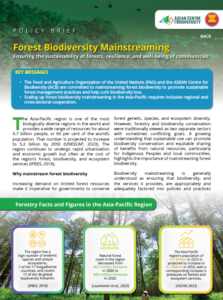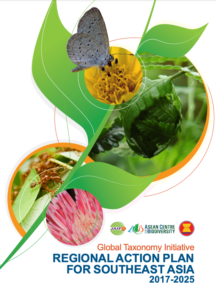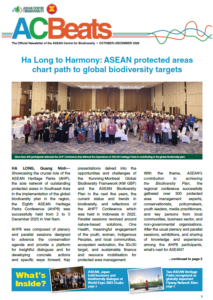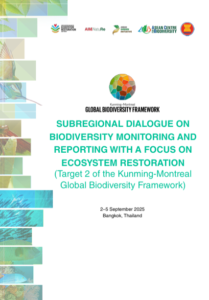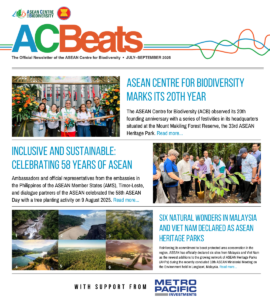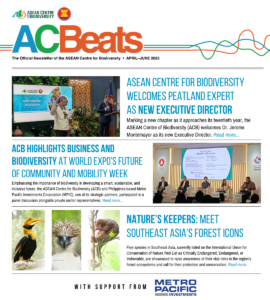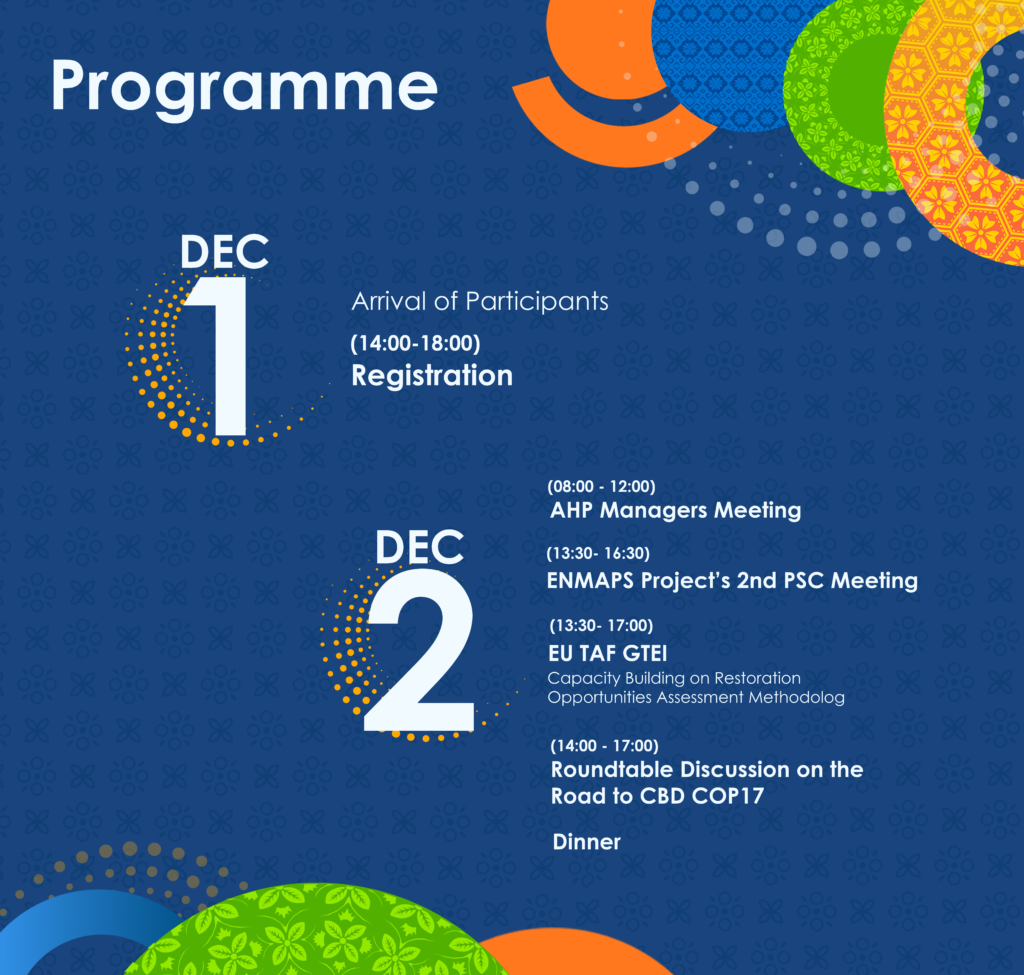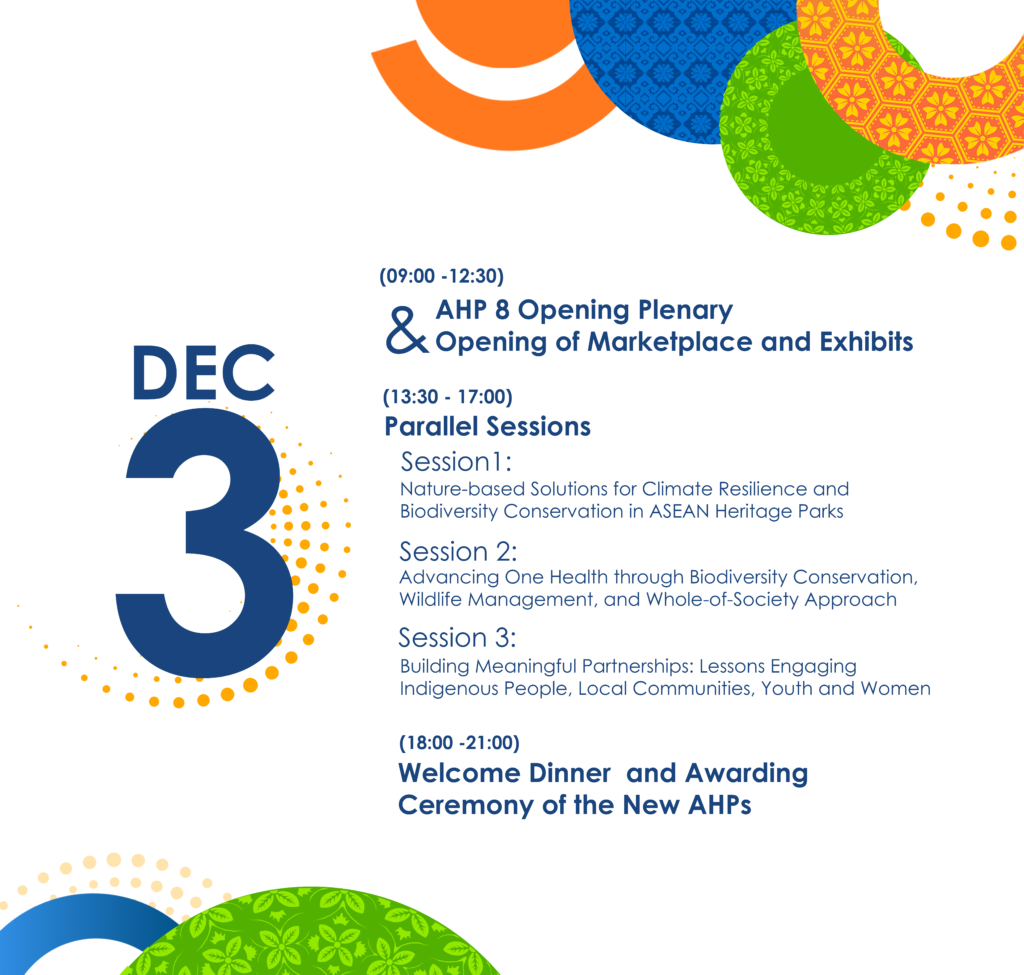COP 16 Side Event with China Partnership for Business and Biodiversity (CPBB)
Centro de Eventos Valle del Pacifico, Cali, Colombia
24 October 2024 | 18:00
OPENING REMARKS
Dr. Theresa Mundita Lim
Executive Director, ASEAN Centre for Biodiversity &
Chair, Executive Committee of the Global Partnership for Business and Biodiversity
Distinguished guests,
Mr. Liu Ning, Deputy Director General, Department of Nature and Ecology Conservation, Ministry of Ecology and Environment
Mr. Li Yonghong, Deputy Director General of the Foreign Environmental Cooperation Center (FECO), the leading agency for the China Partnership for Business and Biodiversity;
Ladies and gentlemen,
I would like to express my sincere appreciation to the China Partnership for Business and Biodiversity for inviting us to this meaningful side event. As the outgoing Chair of the Global Partnership for Business and Biodiversity (GPBB), I have witnessed first-hand how the Partnership has put us in a better position to advance our efforts to mainstream biodiversity in the private sector – a critical stakeholder in our conservation efforts. During my tenure, we collaborated with partners like Aliarse to produce a compilation of case studies on positive incentives that demonstrate the role of the business community in meeting the Global Biodiversity Targets, particularly, Target 18.
My organisation, the ASEAN Centre for Biodiversity, a part of the GPBB, is an intergovernmental organisation established by the ten ASEAN Member States to address the urgent issue of biodiversity loss in the region. And we are happy to share that the ACB has been selected as one of the subregional technical and scientific support centres for the implementation of the Kunming-Global Biodiversity Framework or the KM GBF in Asia.
The stakes have never been higher due to the rising impacts of the global crises of pollution, climate change, and biodiversity loss. Businesses that depend on biological resources and ecosystem services have been greatly affected by natural disasters exacerbated by climate change and damaged ecosystems. For the private sector, particularly in biodiversity-rich and climate-vulnerable regions like ASEAN and China, addressing these interconnected challenges is paramount for achieving sustainability.
Biodiversity is an important resource and a key factor in long-term, steady economic growth. The long-term success of many businesses is directly tied to the health of natural ecosystems and the diversity of native species in their operational areas. Currently, innovative methods for valuing natural capital and its contribution to economic prosperity are being developed and implemented across ASEAN Member States.
The KM GBF underscores the private sector’s important role in realising the Plan’s goals. Notable targets relevant to the private sector include: Target 14 or integrating biodiversity in decision-making at every level; Target 15 or a call for businesses to assess, disclose, and reduce biodiversity-related risks and negative impacts; Target 18, which calls for the reduction of harmful incentives by at least USD 500 billion per year, and scale up positive incentives for biodiversity; and Target 19, which calls on parties to mobilise USD 200 billion per year for biodiversity from all sources, including USD 30 billion through international finance.
In the ASEAN region, one of our key achievements was establishing a regional network of private sector leaders committed to transitioning towards a greener, more sustainable future for ASEAN. This transition is driven by the need to mainstream biodiversity and nature-based solutions in the strategic priorities of businesses across the region, through the ASEAN Business and Biodiversity Initiative or the ABBI.
At the ASEAN Business and Investment Summit last year, the ACB and the ASEAN Business Advisory Council signed a Memorandum of Understanding to formally launch the ABBI. Since then, we have put a lot of effort into creating a strong network of businesses and financial organisations across ASEAN, collaborating with them to include nature-based solutions and biodiversity into their sustainability and climate action plans.
Additionally, we have partnered with the Ministry of Natural Resources and Environmental Sustainability and PETRONAS in Kuala Lumpur to organise the first-ever business and biodiversity forum in ASEAN. The ASEAN Business and Biodiversity Forum, themed “Progress in Sustainable Growth through Investing and Collaborating for Nature,” convened business and sustainability leaders from across Southeast Asia to discuss the private sector’s role in addressing the triple planetary crisis of biodiversity loss, climate change, and pollution.
To continue these efforts, we need increased support and collaboration with relevant international and regional partners, especially those working with the private sector. Identifying areas for collaboration and complementing sectoral initiatives can create impactful synergies, demonstrating that biodiversity-positive businesses represent viable investments.
The CPBB has played a crucial role in engaging the Chinese private sector in the conservation and sustainable use of biological diversity. The work of the FECO in this area is highly commendable, and we hope to learn from your experiences regarding biodiversity-friendly, responsible, and sustainable business practices. We aim to explore potential collaboration between the ACB and CPBB to further our efforts under the ABBI in engaging businesses to meet the KM GBF, including promoting nature-based solutions to address climate change and other global challenges.
Next year, Malaysia will chair ASEAN, and the ACB is poised to continue collaborating with the business sector and regional development partners to advance strategies for a bluer and greener economy. Our goal is to achieve an “inclusive and sustainable” community that continues to work together by breaking silos and fostering cooperation to make peace with nature.
Xie Xie!


